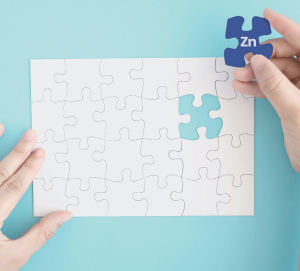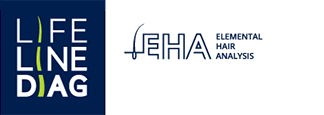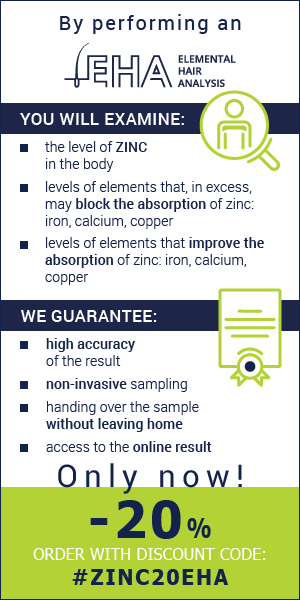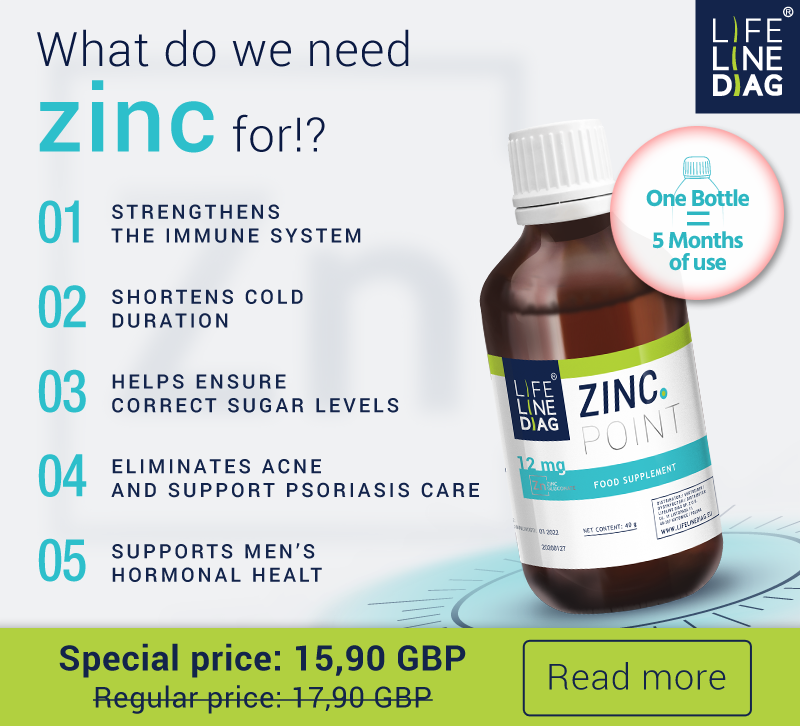
Zinc is one of the most important trace elements in the body. It’s a component of over 300 enzymes and proteins and plays a crucial role in the synthesis of steroid hormones. What products is it found in? Meat, seafood and whole grains are the richest sources of zinc. It’s worth noting, however, that only 30% of zinc taken with food is actually absorbed. For men, absorption ranges between 8mg and 15mg per day, and for women, it’s approximately 8mg per day. With age, zinc absorption decreases even more, and even though zinc excretion decreases proportionally, remember to consume enough to maintain a safe balance.
ZINC DEFICIENCY – CAUSES, SYMPTOMS AND DIAGNOSTICS
Zinc deficiency affects up to 30% of the population. It’s caused by a poor diet and diseases that prevent its absorption. Zinc deficiency is difficult to diagnose, because to date, reliable markers of its existence haven’t been established. Researchers are trying to investigate the level of this element using many methods, for example, by determining its amount in the serum or plasma, urine, erythrocytes, leukocytes, saliva, or by examining alkaline phosphatase. The most-effective methods are tests using isotopes or radioisotopes. However, due to the complicated nature of these tests, they’re unavailable to most of us. That’s why plasma and serum tests are the most common ones, but because many factors, such as stress, infections, steroid medications, pregnancy, fasting, etc. can affect the amount of zinc in the blood, these tests aren’t accurate.
Because of the difficulty in diagnosing zinc deficiency using the above methods, some doctors and nutritionists try to analyse patient symptoms. However, such diagnoses also aren’t simple and unambiguous, as zinc has so many different functions in our body that its lack can manifest itself in many ways. Both loss of appetite and lethargy, as well as irritability and anxiety, can be signs of zinc deficiency. Low zinc levels may result in poor smell and taste, hearing impairment and tinnitus. In men, libido may decrease. In children, zinc deficiency causes a slower development. People with zinc deficiencies don’t tolerate alcohol and glucose well, they get anaemia, poor wound healing, intestinal diseases and diarrhoea. Susceptibility to infection and parasites increases. The ability to learn and remember decreases. Zinc deficiency may also manifest as atherosclerosis.
Low zinc levels in the body may result in disease, including sickle cell anaemia, celiac disease, Crohn’s disease, liver cirrhosis, anorexia and HIV. Deficiency may also occur as a result of kidney damage, or due to chronic diarrhoea, extensive burns, or addiction to alcohol or drugs. The reasons may also be more mundane. Zinc deficiency can occur in people who consume excessive amounts of coffee and foods rich in iron, copper, calcium, phosphorus, fibre and phytic acid. Don’t forget that low zinc levels aren’t always due to disease. Breastfeeding mothers, pregnant women, athletes (especially those who practice endurance sports such as running or cycling) and vegetarians are prone to zinc deficiency. So since blood testing and interpretation of symptoms don’t always give an actual picture of the concentration of zinc in the body, a good alternative is elemental hair analysis, which gives an unambiguous idea of its level.
SUPPLEMENTATION
After a correct diagnosis of zinc deficiency, supplements can be beneficial. Supplementation should, however, be chosen and used under the supervision of a specialist, because zinc deficiency may be associated with a reduced level of other elements. For example, taking zinc supplements, even in low doses of 18mg per day, limits the absorption of copper, which in the long-term may lead to a deficiency of this element. Zinc supplementation can also cause iron deficiency.
Many studies have been conducted on the beneficial effects of zinc supplementation. Athletes and anyone who performs a heavy physical exercise daily can benefit from it. This is because large amounts of zinc are excreted with sweat. Besides, organic zinc supplementation raises the level of testosterone and insulin-like growth factor (IGF-1), which contributes to improved cell growth and muscle protein synthesis.
Low levels of zinc reduce the number of lymphocytes, which are immune system cells. That’s why replenishing this element counteracts decreased immunity, which the elderly and endurance athletes are particularly prone to. In these people, for some time after training, the amount of antibodies, including lymphocytes, is reduced, opening the way for bacteria, viruses and fungi.
Zinc modulates signal transmission in nerve synapses. Thanks to this, it has anti-depressant properties, even in the case of diseases that are resistant to treatment with psychotropic drugs. Studies have been conducted in which patients took zinc for 12 weeks, and it significantly reduced their symptoms of depression. Other studies have also shown that eliminating zinc deficiency in older people improved their association skills and reduced the symptoms of dementia.
Taking zinc supplements reduces blood glucose levels and improves insulin sensitivity, which is particularly important in obese people.
In people with zinc deficiency, supplementation reduces the level of CRP, which is the protein that shows up in the blood as a consequence of inflammation. Reducing the level of this indicator is considered to be important in atherosclerosis and cardiovascular diseases.
Zinc deficiency is common nowadays. Due to the huge role that it plays in the body and the serious effects of deficiency, appropriate diagnostics and supplementation should be used along with checking iron and copper levels.
Anna Borszewska, Niedobór cynku – przyczyna i skutek wielu groźnych schorzeń, [Zinc deficiency and supplementation] DietPoint, 1(2)/2019, s. 10-13.















